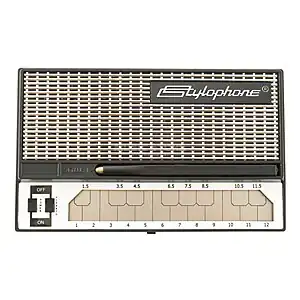 | |
| Type | Musical instrument, toy |
|---|---|
| Inventor | Brian Jarvis |
| Inception | 1967 |
| Manufacturer | Dubreq |
| Available | Yes |
| Models made | S1, S2, Beatbox, Gen X-1, GEN R-8, S1 analog re-issue, Limited Edition Bowie Stylophone, Beat |
| Website | https://stylophone.com/ |
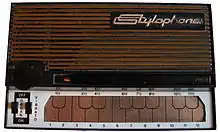
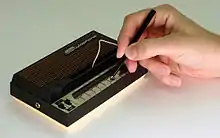
The Stylophone is a miniature analog electronic keyboard musical instrument played with a stylus. Invented in 1967 by Brian Jarvis,[1] it entered production in 1968, manufactured by Dubreq.
Some three million Stylophones were sold, mostly as children's toys, but they were occasionally used by professional musicians such as John Lennon,[2] Kraftwerk and David Bowie.[3]
Original models
The Stylophone consists of a metal keyboard made of printed circuit board and is played by touching it with a stylus. Each note on the keyboard is connected to a voltage-controlled oscillator via a different-value resistor, and touching the stylus to the keyboard thus closes a circuit. The only other controls are a power switch and a vibrato control on the front panel beside the keyboard, and a tuning potentiometer on the rear.
The Stylophone was available in standard, bass and treble variants, but the standard version was the most common. There was also a larger version called the 350S with more notes on the keyboard, various voices, a novel wah-wah effect that was controlled by moving the hand over a photosensor and two styluses.
In the mid-1970s, a new model appeared that featured simulated wood on the speaker panel and a volume control. However, production of the Stylophone ceased in 1975.
Entertainer Rolf Harris served for several years as the Stylophone's advertising spokesman in the United Kingdom and appeared on many "play-along" records sold by the manufacturer.[2]
2007 revival
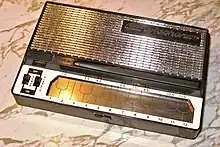
In October 2007, 28 years after the Stylophone had ceased production, toy company Re:creation, in conjunction with Dubreq Ltd. (reformed in 2003 by Ben Jarvis, the son of the original inventor), relaunched the Stylophone. The 2007 revival model, manufactured in China and was officially called the S1, is a digital copy that closely resembles the 1960s original but features a volume control, audio throughput and two new sounds.[4]
Stylophone S2
In December 2012, Dubreq released the Series 2 Stylophone, a limited edition, British-made, true analogue synthesizer.[5]
Stylophone Beatbox
This model strays from the normal box-shaped Stylophone. It is a mainly round case that has a circular keypad containing 13 contact areas. It offers three sound banks and a tempo control. It also features a basic record/loop function.
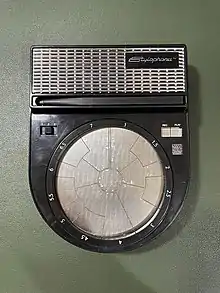
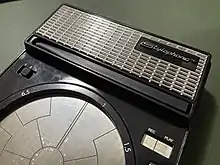
Stylophone Gen X-1
In January 2017, Dubreq released details of the Stylophone Gen X-1 portable analogue synthesizer.[6] It was designed and manufactured by Dubreq[7] and retails at £59.99 or €69.99. The Gen X-1 has additional controls for LFO, analog delay, low-pass filter, and envelope settings. It also includes sub-octave switches, and an input so it can be used as an effects unit[8]
Stylophone GEN R-8
In 2019, Dubreq announced the Gen R-8, a limited edition, full-analogue, metal-cased Stylophone. This version has features seen on more expensive analogue synthesizers and is considerably larger than the standard model. An initial batch of 500 has been released.
Stylophone Analog Sound S1
In 2020, Dubreq released a replacement for the 2007 S1. The new model is visually similar to its predecessor but has less rounded corners and no auxiliary input. Internally, the digital sampled sounds have been replaced by an analogue oscillator based on a 555 timer IC, and the tone selector offers three octave ranges. The sound is much more similar to that of the 1970s versions.
Bowie Limited Edition
In 2021, Dubreq launched a limited edition version of the Analog S1 as a tribute to the late David Bowie. This model has an all-white finish, has an official Bowie logo moulded into the chromed grille and includes a colour-printed booklet including photos, interviews and tablature for a selection of Bowie's songs.[9]
Stylophone Beat
In October of 2023, Dubreq released the successor to the Stylophone Beatbox, the Stylophone Beat.
Stylophone Theremin
In 2024, Dubreq are promising a Stylophone themed (pitch-only) Theremin. (Pre-order https://stylophone.com/theremin-pre-order/ )
In popular culture
- One of the earliest uses of the Stylophone in pop music was in the Small Faces song "Donkey Rides, A Penny, A Glass",[10][11] which was released as the B-side of their single "The Universal" in June 1968.[12][13]
- John Lennon played a Stylophone during a rehearsal of the George Harrison song "Old Brown Shoe" on 28 January 1969.[14]
- David Bowie is credited with playing the Stylophone on his 1969 debut hit song "Space Oddity" and also for his 2002 album Heathen track titled "Slip Away,"[6] as well as on the song "Heathen (The Rays)".[15]
- Kraftwerk's 1981 song "Pocket Calculator" features the Stylophone among the song's main instruments and ends with a Stylophone solo.[3]
- The Tall Dwarfs' song "All My Hollowness to You" from the 1981 EP Three Songs uses the Stylophone as the main instrument.[16]
- The 1999 track "Style" (and its several other versions) by Orbital takes its name from the Stylophone, which is used extensively on the track.[17]
- Richard Barone uses the Stylophone on numerous recordings, including "Glow" and '"Girl" from his 2010 album Glow. In the latter song, it is played by his producer Tony Visconti.
- The Stylophone is used as a main instrument by Russian rock group Gromyka.[18]
- British band Pulp use the Stylophone prominently in their song "Styloroc (Nites of Suburbia)", which appears on their 1992 Babies single and 1993 compilation album Intro – The Gift Recordings.[19]
- The 2017 film Baby Driver features the Stylophone briefly in one scene.[20]
- Min-Gi Park (voiced by Johnny Young) from the animated show, Infinity Train, was shown to own a stylophone.
References
- ↑ David McNamee (6 July 2009). "Hey, what's that sound: Stylophone | Music". Theguardian.com. Retrieved 4 June 2015.
- 1 2 Michael Johnson (23 April 2004). "Do you remember Stylophone?". doyouremember.co.uk. Retrieved 4 March 2017.
- 1 2 "Top 5 Stylophone Songs - Get Inspired!". www.pmtonline.co.uk. Retrieved 16 January 2022.
- ↑ Elliott, Amy-Mae (14 September 2007). ""Iconic" Seventies Stylophone to be revived by HMV". Pocket-Lint Ltd. Retrieved 10 April 2008.
- ↑ "Dubreq Stylophone S2". Stylophone2.com. 28 January 2013. Archived from the original on 6 October 2017. Retrieved 4 June 2015.
{{cite web}}: CS1 maint: unfit URL (link) - 1 2 "Dubreq Stylophone Gen X-1". Mi-pro.co.uk. 9 January 2017. Retrieved 9 January 2017.
- ↑ "Stylophone GEN-X1 – Dubreq". dubreq.com. Retrieved 1 November 2018.
- ↑ "STYLOPHONE GEN-X1". stylophone.com. Retrieved 19 February 2023.
- ↑ "DAVID BOWIE LIMITED EDITION STYLOPHONE". stylophone.com.
- ↑ O'Brien, Jon (17 September 2020). "The Stylophone: The Enduring Legacy of One of the World's Smallest Pocket Synths". Reverb. Retrieved 25 June 2022.
- ↑ Lewry, Fraser (15 April 2020). "Watch Rammstein's classic Sonne performed on Stylophone (with added pyro!)". Louder Sound. Retrieved 25 June 2022.
- ↑ Muise, Dan (2002). Gallagher, Marriott, Derringer & Trower: Their Lives and Music. Hal Leonard LLC. p. 94. ISBN 9780634029561.
- ↑ Cozzen, R. Duane (2015). The British Music Invasion: Collectors Quick Reference. Lulu.com. p. 148. ISBN 9781329031685.
- ↑ The Beatles: Get Back, part 3, 00:56:54
- ↑ "Stylophone on Twitter". Twitter. Retrieved 17 September 2021.
- ↑ Tall Dwarfs - All Of My Hollowness (live), retrieved 26 November 2023
- ↑ "The single and the instrument described by Loopz, the official Orbital fanzine".
- ↑ "ГРОМЫКА - "Говорил я вам"/ GROMYKA - "As I Said Unto You"" (in Russian). YouTube.com. 5 November 2015. Archived from the original on 22 December 2021. Retrieved 12 April 2016.
- ↑ "Pulp - Styloroc (Nites of Suburbia)". YouTube.com. 28 April 2009. Archived from the original on 22 December 2021. Retrieved 13 July 2016.
- ↑ "Stylophone Baby DriverAttack".